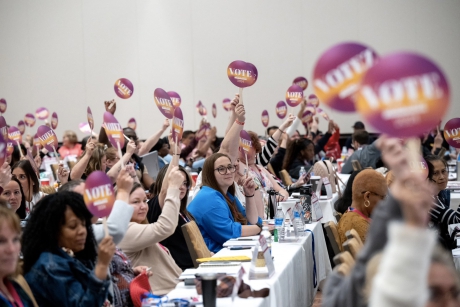Reports
You are here
CUPE Ontario convention 2024 – continuing the struggle

June 12, 2024
Approximately 1200 delegates recently attended the CUPE Ontario Division convention that took place in Toronto from May 28 to June 1. Some of the issues were common to CUPE Ontario conventions, but there were a number of new, and hopeful wrinkles, and resulting challenges.
Labour for Palestine
Labour for Palestine (L4P)-CUPE was well organized and began meeting at least a month prior to the convention. We organized, along with activists from other unions, around the motions to hit the convention floor, staffing the information booth outside the conference room, and presenting delegates with relevant information. The booth itself was co-hosted by both L4P and Independent Jewish Voices (IJV).
CUPE Ontario has had a Boycott, Divest, Sanctions (BDS) position since 2006, the first major provincial union to do so. An emergency resolution that hit the floor called for renewing CUPE Ontario’s commitment to BDS, to oppose the bombing of Rafah, and to demand an embargo on Canadian arms sales to Israel (these sales have to be okayed by the federal government). The motion was widely supported.
There was a small group of zionist members who had launched a human rights complaint against CUPE Ontario, Fred Hahn, Local 3906 (McMaster U.) after October 7, and L4P/IJV members were prepared for their opposition (which was weaker than in past conventions). Delegates lined up at the mike to support this resolution. In addition, CUPE Ontario, in its “Action Plan”, reaffirmed its support for the student encampments that have sprung up all over Ontario and the rest of Canada.
In an interesting form of intersectionality, a motion hit the floor, spoken to by Retiree delegates, opposing pension monies being spent on the arms industry. It stipulated that workers’ deferred wages (pensions, benefits) not be spent on war and genocide. The Retirees were joined by L4P/IJV delegates at the mikes. In opposition to the resolution (and in support of the arms industry), the same pro-zionist delegates rose. Earlier they had called for Fred Hahn’s resignation from the floor (he ran for CUPE-O President unopposed), but this was surely a low point for them as they were soundly defeated in the vote.
Building Power at the Base
After years of argument from activists, and the inspiring example of the “Front Commun”(Common Front) in Quebec, CUPE Ontario has begun to seriously embrace joint sectoral bargaining. This strategy will not just bring together in bargaining the largest number of locals in a sector, but also calls for a common front with other unions. In healthcare, the Ontario Council of Hospital Unions, OCHU-CUPE, allied with the Service Employees International Union (SEIU-Healthcare) and Unifor to bargain against hospital management and Ford government healthcare cuts. With support in the community by the Ontario Health Coalition, they were able to make important gains in staffing and pay for frontline workers who deliver healthcare. In the next round, OPSEU will also be included, making our bargaining power as workers even stronger.
This was reflected in our Action Plan, which calls for sectoral bargaining plans to be made. This is particularly important in the educational field, where workers in the Ontario School Board Council of Unions (OSBCU-CUPE) won a huge victory over the Ford government in the Fall of 2022. Formal alliances with OPSEU, and teachers’ unions could only reinforce our power to stop the cuts in education, and restore staffing levels.
Anti-Hate
CUPE Ontario has long been a leading advocate for mobilization against the far-right and the Conservatives. Resolutions to defend CUPE Library workers against the attacks on Drag Queen Story Time events were reaffirmed. Such motions can serve as a green light for activists on the ground in the anti-hate movement, to contact and involve CUPE locals throughout the province. This stance has been strengthened by CUPE Ontario’s Anti-Racism Organizational Action Program (AROAP), in which the demands and representation of racialized members has been, and continues to be brought to the forefront of the union. AROAP, our commitment to Indigenous Solidarity, and solidarity with the 2SLGBTQ+ community makes our strength in mobilization, and our fight against the far-right that much stronger.
How do we get action?
The question we on the left have to answer in CUPE, not unlike other unions, is how do we bring such positive motions into being. The “Action Plan” brings a lot of activists to the mike, in order to perfect it, but we then leave it to our Ontario Executive Board to carry out. This top-down approach will not bring the fundamental mobilization that will be necessary to take on the employing class and its agenda. We need to think on the actual mechanisms at the Local level to involve members, such as our District Councils (many of which have ceased to operate), our participation in Labour Councils, and our ongoing participation in the groups like the Ontario Health Coalition, where union presence is important, but stands to get stronger.
This would allow us to organize seamlessly to support strikes, and to picket any employer that even dares to propose a cut to public services and staffing. As a comrade wore on his inspiring t-shirt: “Create Terrifying Union Power”. We need to find a way to get there – and that can only happen when we build links between the Locals, and with other unions in each region of the province.
This quote should say a lot, from the Action Plan: “As part of the working class, we face similar challenges and threats from capitalism. The pursuit of profit in capitalism prioritizes individual gain over collective well-being, leading to exploitation, inequality, environmental degradation, fragmentation, and financial instability. These threats highlight the need for a more equitable, sustainable, and socially responsible system that prioritizes well-being and environmental protection”. We need to find a way to make this a reality.
Peter Votsch is a member of CUPE Local 7797 and CUPE Retirees Network.
Photo: CUPE Ontario - twitter
Section:










